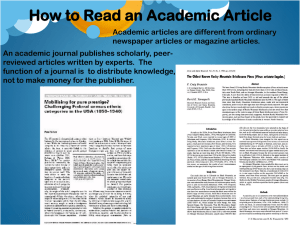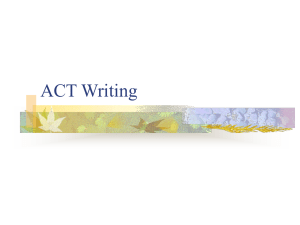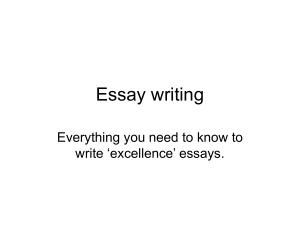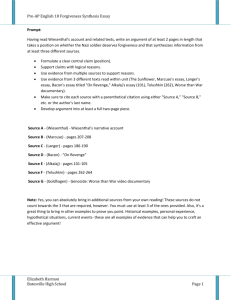click for link
advertisement
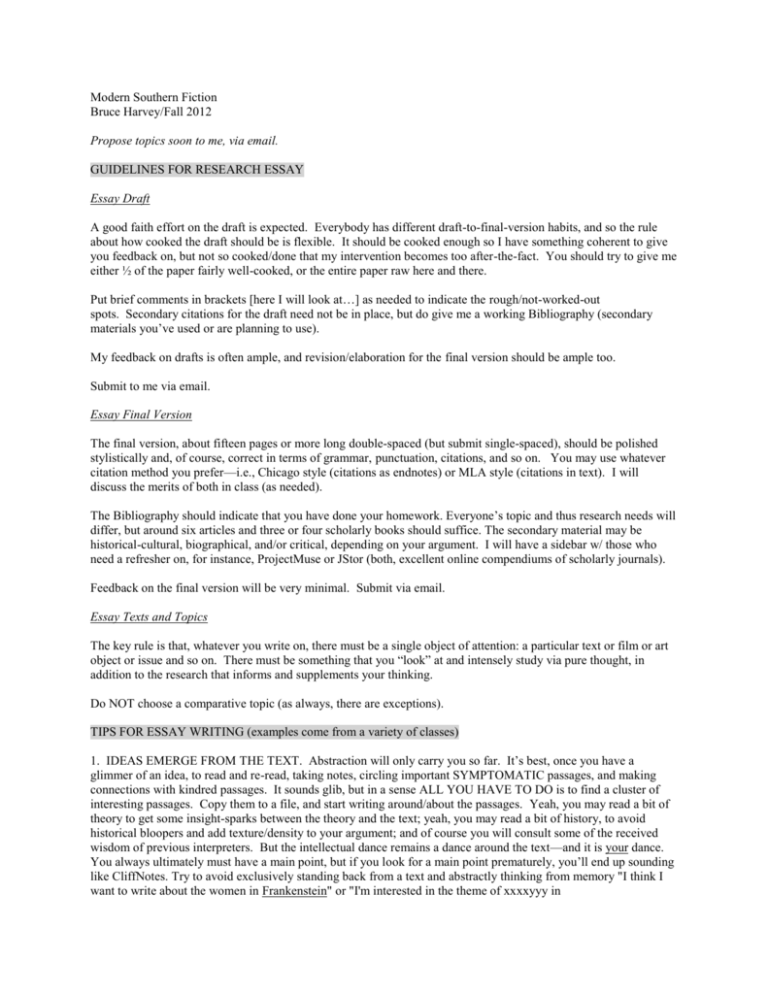
Modern Southern Fiction Bruce Harvey/Fall 2012 Propose topics soon to me, via email. GUIDELINES FOR RESEARCH ESSAY Essay Draft A good faith effort on the draft is expected. Everybody has different draft-to-final-version habits, and so the rule about how cooked the draft should be is flexible. It should be cooked enough so I have something coherent to give you feedback on, but not so cooked/done that my intervention becomes too after-the-fact. You should try to give me either ½ of the paper fairly well-cooked, or the entire paper raw here and there. Put brief comments in brackets [here I will look at…] as needed to indicate the rough/not-worked-out spots. Secondary citations for the draft need not be in place, but do give me a working Bibliography (secondary materials you’ve used or are planning to use). My feedback on drafts is often ample, and revision/elaboration for the final version should be ample too. Submit to me via email. Essay Final Version The final version, about fifteen pages or more long double-spaced (but submit single-spaced), should be polished stylistically and, of course, correct in terms of grammar, punctuation, citations, and so on. You may use whatever citation method you prefer—i.e., Chicago style (citations as endnotes) or MLA style (citations in text). I will discuss the merits of both in class (as needed). The Bibliography should indicate that you have done your homework. Everyone’s topic and thus research needs will differ, but around six articles and three or four scholarly books should suffice. The secondary material may be historical-cultural, biographical, and/or critical, depending on your argument. I will have a sidebar w/ those who need a refresher on, for instance, ProjectMuse or JStor (both, excellent online compendiums of scholarly journals). Feedback on the final version will be very minimal. Submit via email. Essay Texts and Topics The key rule is that, whatever you write on, there must be a single object of attention: a particular text or film or art object or issue and so on. There must be something that you “look” at and intensely study via pure thought, in addition to the research that informs and supplements your thinking. Do NOT choose a comparative topic (as always, there are exceptions). TIPS FOR ESSAY WRITING (examples come from a variety of classes) 1. IDEAS EMERGE FROM THE TEXT. Abstraction will only carry you so far. It’s best, once you have a glimmer of an idea, to read and re-read, taking notes, circling important SYMPTOMATIC passages, and making connections with kindred passages. It sounds glib, but in a sense ALL YOU HAVE TO DO is to find a cluster of interesting passages. Copy them to a file, and start writing around/about the passages. Yeah, you may read a bit of theory to get some insight-sparks between the theory and the text; yeah, you may read a bit of history, to avoid historical bloopers and add texture/density to your argument; and of course you will consult some of the received wisdom of previous interpreters. But the intellectual dance remains a dance around the text—and it is your dance. You always ultimately must have a main point, but if you look for a main point prematurely, you’ll end up sounding like CliffNotes. Try to avoid exclusively standing back from a text and abstractly thinking from memory "I think I want to write about the women in Frankenstein" or "I'm interested in the theme of xxxxyyy in Frankenstein." Instead, look for the little oddities, etc., that lead you to track down a pattern of oddity/tension/'crisis' in the text. It doesn't mean that you end up writing about trivia; it just means you avoid starting with abstract themes or issues in your brain-storming/idea-generating process. 2. ARGUMENTS ARE NOT DICED-UP THEMES; THEY SHOULD HAVE SOME DRAMA/CRISIS/TENSION (but don't get melodramatic). One does not want to say "the theme of disease has three aspects in Blu's Hanging." We are taught to think that way in high school and in composition classes. Maybe we need to start out that way, but it leads to limited rhetorical possibilities and limited argument sophistication. It is better to think of a text as having an issue that it is "obsessed" by and needs to find a "remedy" for. Then you sort of play doctor/detective. The practical way of getting tension is to take clusters of passages via TIP ONE above and get a flow chart involving three to seven clusters or idea arcs. Maybe even start your paper with an odd quote that manifests, as it were, a symptom. And then you uncover layer by layer the complexities of the issue/problem, and then show how the problem is resolved or not resolved (this does not mean you use the words “problem” or “resolution”—just that there is intrinsic tension within the topic. In an ideal world, these complexities and issues resonate with something within you, which makes you want to chase down meaning. The reader doesn’t want to know what your obsessions are, but I do believe personal connections to your “objective” material makes for stronger, more incisive and interesting arguments usually. 3. DO NOT GO INTO CELEBRATION MODE, as if you writing an introduction to some high-school edition of the text. But also watch for hyper-suspicion mode; above I say that analysis looks for symptomatic passages/patterns, and yet looking on the text as having a “pathology” can be carried too far. 4. DO NOT RUN TO THE LIBRARY IMMEDIATELY (BUT DEFINITELY GO LATER). You must think through some issues before you go to the library. If you "own" an idea initially, your research will have direction and focus and you will be less likely to get lost in the morass of other scholarly perspectives. But ultimately you must be in dialogue with other specific interpretations. Good scholarship assumes an audience that is engaged in ongoing dialogues about authors or texts or issues. 5. EACH ARGUMENT IDEA OR ARC IS NEVER DONE IN TERMS OF REVISION. Everyone's draft-tocompletion process works differently. But usually you have to go through a draft over and over and over again, heaping on layers of complexity, twists and turns, more "But this is not the real malaise the family suffers from. If we go back to the first scene, the real problem turns out to be...."s. The obvious problem with this is that you may not have time to slowly cook the paper. But that, nonetheless, is what I am asking of you. 6. PLAY WITH TITLES AND SUBSECTION TITLES early on in the process. This may seem to go against the "don't think abstractly" rule, but trying to come up with clever titles in fact can work as a good way of brainstorming, as long as you see them as being provisional. You might not even know what your title means initially! Vice-versa: sub-headings can help control some of those wacky ideas that get too wacky, because you know whether sub-contents fit the sub-label. 7. WE MUST KNOW YOUR THESIS/MAIN POINT BY THE END OF YOUR INTRODUCTION. But don't think of a thesis as capturing the entirety of your argument. All that is needed is a nomination of the main issue/question in play (not the answer). This allows for an inductive rather than deductive approach. (Most of my tips are suggesting an inductive method of getting ideas and composing.) Definitely have an extra line space between your introduction and the rest of the paper. It is OK, and probably desirable, to have introductions that are several paragraphs long, but the reader in such cases needs to know where the introduction ends. 8. FIRST REAL SECTION OF YOUR ESSAY MIGHT BE HISTORICAL. After your introduction, depending upon your topic/text, you might have some background information about the author, the era, the place, etc. This is reassuring to the reader because it makes you seem knowledgeable. 9. OR YOU MIGHT SITUATE YOUR ISSUE/TEXT WITHIN THE SCHOLARLY TRADITION/DEBATE ABOUT IT. This also gives your voice authority. I myself don't do this, or rather save such placing-of-myargument for long, long endnotes. I don't like to hear my own argument, as I'm making it, bounced against others. However, most essays do the bouncing. Example: "A number of scholars interested in postcolonial AsianPacific fiction have focused on how indigenous populations or authors can return the 'gaze' of the imperialist. Not surprisingly, this has been noted in Blu's Hanging, particularly by scholar x and scholar y in respect to the haole school-teacher...." You will have other professors who will expect you to be upfront in this fashion, and that is fine, too. I want you to do your homework, but you can show you did your homework in the endnotes, at least in respect to specific interpretations by other scholars. 10. IF YOU DON'T, DO READ YOUR OWN PROSE ALOUD for a better style. It is easy (especially if you use theoretical terms) to start getting pompous sounding and lost in verbiage. 11. PAY ATTENTION TO WHAT WORKS FOR YOU IN THE SCHOLARSHIP YOU READ. This may mean specific rhetorical maneuvers (i.e., how to write an introduction), or just words that you've never used before and that have a lot of critical-theoretical possibilities packed within (I don't mean the obvious ones such as "gaze", but less obvious ones such as "syncope" or "scopic" or "aphasia"). It sounds dull, but you should start keeping a list of such words. 12. DO NOT BE AFRAID OF BEING THEORETICAL, BUT DEMYSTIFY THEORY BEFORE YOU BEGIN USING IT. Applying theory can be the direct, self-conscious application of a theoretical perspective (and perhaps querying the utility of the perspective at the same time); or the theory can mostly be in the sort of issues/content you focus on (gender issues, sexuality, body stuff, imperialism, othering); or it can be the use of a certain vocabulary (gaze, other, compulsory heterosexuality, and so on). The extent to which you actually cite theorists in your essay, if you are so inclined, is going to be highly variable according to your topic, personal style, background and so forth. Theory (to me) is best used as a brainstorming device--a lens that helps you see things you might not already see. Your own idiosyncratic interests and the need for a cogent, coherent argument that YOU believe in will do the rest. That's why I repeat the mantra of "listen to the text" AND "listen to your response." You want to avoid the ventriloquy effect of many contemporary scholarly-interpretive essays, which often all sound very much alike, all making the same moves, all citing the same theorists, and so on. 13. ASSISTANCE AND EXPECTATIONS. I “know” literary theory pretty well, and know just enough of real philosophy (Hegel, Heidegger, etc.) to know “theory” can be … hmmm… not as robust as it sometimes pretends to be. This means that although I respect literary theory, I respect even more any paper that is just plain smart/thoughtful and stylistically decent. An interesting argument or “take” on a text, even with some dangling thoughts and murkiness: I like such more than a too tidy application of theory to a work! The lessons of the sublime apply here, too: I look not for “truth,” but “explanatory power,” and some of the best explanations are provisional and tentative… traces towards… not conclusions. I’m happy to aid you in seeking traces, however I can: meet before/after class. THUMBNAIL SKETCH OF THEORY FOR THE CURIOUS New Criticism Thematic Criticism Issue/Political Criticism sees text as a unified machine producing a literary effect Same as New Criticism but looks at a theme, symbolic pattern, etc: "Hamlet and the Theme of Disease" Same as Thematic, but would have a political angle— feminism, Marxism, etc. More theoretical Marxism, Feminism, Postcolonialism Same as Issue, but argument uses the latest theoretical writers on Marxism and literature and so on. Oftentimes: the quest is to find the “hidden” subversive meaning. Deconstruction Contextual New Historicism Much like New Criticism, but shows how the work falls apart over its binary divides (loves cute inversions— Hamlet suffers from too much ease, not disease!). Could see work in terms of its genre history (Hollywood South Sea Films) or historical context (Lord Paulet and Melville's Typee) Sees text/context as porous. A text might be a 16th medical document as much as the play Hamlet. Almost impossible to do in a semester. GUIDELINES FOR ALTERNATIVE “DUMMIES/IDIOTS GUIDE” Please see above about “Draft” and “Final Version”: much carries over to the “Dummies Guide” option. 1. The trick to a good “Dummies Guide” is recognizing the audience is NOT “Dummies,” but those who want keen perspectives on whatever the topic is, in clear jargon-free prose, that does not “talk down.” Check out the one on Shakespeare. 2. For our purposes, you’re writing something much shorter than a real “Dummies”: so… provide an outline of topics/issues you would include if writing the real thing, but then dig into a several sample sections … just as if you were providing a prospectus to a publisher. This means you can “fake” the outline largely, and choose the sections you wish for me. At least one section needs to be critical-analytical (not just historical/contextual or authorbiographical). 3. Catchy section titles: of course! But don’t get too cute or silly. 4. You need to avoid the banal or the boring: Cliffnotes style “three symbols in The Scarlet Letter… the five main characters… etc”. The reader is not in highschool! 5. Quotes from the text/author: some ok to elucidate a point, but don’t go overboard. 6. Wit and the unusual: welcome! Example: “It is the hallmark of many great writers, profound and idiosyncratic, that his or her style can be parodied. We can parody Hemingway or Henry James, and especially Faulkner. Faulkner, famously or infamously, is known for his, ‘Faulknerese.’ A quick example can be both fun and illuminating. So here’s a parody of Faulkner: ‘The waiter, his eyes expectant with a profound immemorial not-longing, doomed by the long slow iteration of unsuccess, extended his hand, static and quick above the table linen, to drop the dinner-check--its palpable flatness not hallowed by the custom of his forefathers of earnest exchange or of service rendered without qualm and yet in proud receipt of solid coin--where it lay in pregnant abeyance.” [not all that clever/composed hurriedly!] We can note, first, the polysyllabic overkill….” GUIDELINES FOR ANNOTATED EDITION (think trade-paperback—Signet, etc.—not Norton) 1. A biographical essay that leads/coordinated with #2. Five-ten pages. 2. A critical/analytical introduction or preface. These are best when not “complete” mini-interpretive essays, but rather a cohesive highlighting of important issues, significant historical context or publishing history of the author, and so on. #1 biography could be folded in. Ten pages+ (depending on whether including bio.) 3. Annotations: a sampler for our purposes, no need for being comprehensive; imagine the audience being a College Freshperson, or general literate/book-loving reader; concentrate on less-than-obvious historical references, mythical allusions, and so on. A page, singled-spaced, will suffice. Use any format (cue b/w text and annotations) that makes sense. GUIDELINES FOR CULTURAL-CRITIQUE ESSAY 1. Ditto as above for traditional paper about first version ½ cooked. Here you can be more journalistic, using a tone/style and level of critical inspection/cultural exegesis appropriate for, say, The New Yorker. 2. As there are so many possibilities, I have no “rules” here really. Maybe you start off by reviewing the last J. Cash CD, the one with the “Hurt” song (there’s a video, too)… and broaden out to talk about what essential “Cash”ness is in terms of Southerness, and move on to other music. Maybe you examine some element of faux-Southerness (a restaurant chain). The main feature: a nimble, polished and engaging prose-style. 3. As cleverness, style, and topic-interest trump all considerations: length…. 10 pages+ or so. GUIDELINES FOR BOOK REVIEW: SCHOLARLY 1. Present a review of a scholarly/secondary book (not an article) about or related to one or several of our authors or the issues/content in the course or your paper topic: a biography, a work of literary-cultural interpretation, an historical or cultural studies volume, or a theoretical volume, etc. 2. Efficiency=selecting a secondary work that you already are using for your essay, if doing the critical-analytical flavor. However, select a fairly recent volume, not more than a decade old. 3. It should be between one and two single-spaced pages, and written in a format and style kindred to what you would find in an academic journal. The best models to emulate: just go to JSTOR or ProjectMuse and select a journal, and read a handful of reviews. “The New York Review of Books” review are usually much, much longer; chatty; and often more about the author than the secondary book on the author… so I would avoid as models for our purposes. Book reviews are usually at the end of a journal. 4. Although short, this should be a showpiece: your very best, impeccable writing. 5. The review should include: a) A summary of the argument/content of the work. b) A critical assessment pointing out strengths and weaknesses. As a general rule, don’t get too snarky. c) If you were really writing a review, and knew the subject matter well, you'd have also a prefatory paragraph that puts the work in a larger context of kindred works ... but I'm not expecting that necessarily. d) It's good to have a couple of key brief quotes to exemplify good points or bad points or crucial terminology. e) The review should NOT indicate that you are a student; please imitate the tone and rhetoric of the professionals. 6. Submit single-space, via email, to me. GUIDELINES FOR BOOK REVIEW: FICTION, ETC. 1. As I don’t review fiction et al, hard for me to give guidelines. 2. Go to any reputable all-purpose venue—New York Review of Books, Times Literary Supplement, etc.—and imitate; obviously, you need to be looking at relatively short reviews. 3. Try to choose, if possible, a recent work/author… so that your review will have novelty & freshness. 4. Showpiece/impeccable style here, too. 5. One or two single-spaced pages long. 6. Submit single-space, via email, to me. ORAL REPORT GUIDELINES 1. Efficiency here, too: cannot just duplicate your main paper, but fine to be in the neighborhood. 2. The topic can be related to one of our authors, one of our course “themes” or issues, or just related to the course in general. 3. See the RealSouth Magazine for potential types of issues/topics. 4. Your report should imply, without trotting out, “expertise”—either by virtue of general personal knowledge (a subset of “Blues” for instance) or research. 5. Try to avoid a dry litany of facts… it is not a “school report”. It’s a clever, perhaps even profound slice of cultural idiosyncrasy… something the class doesn’t already know much about. 6. As always, it’s best to have your topic anchored in something you can/we can focus on discretely: that’s why I suggest topics such as, say, the background to Cash’s “Hurt” song/video. 7. About 10 minutes long, sans notes (one notecard): audio/handouts/video-clip, as needed, are welcome (e.g., the Cash “Hurt” video).




